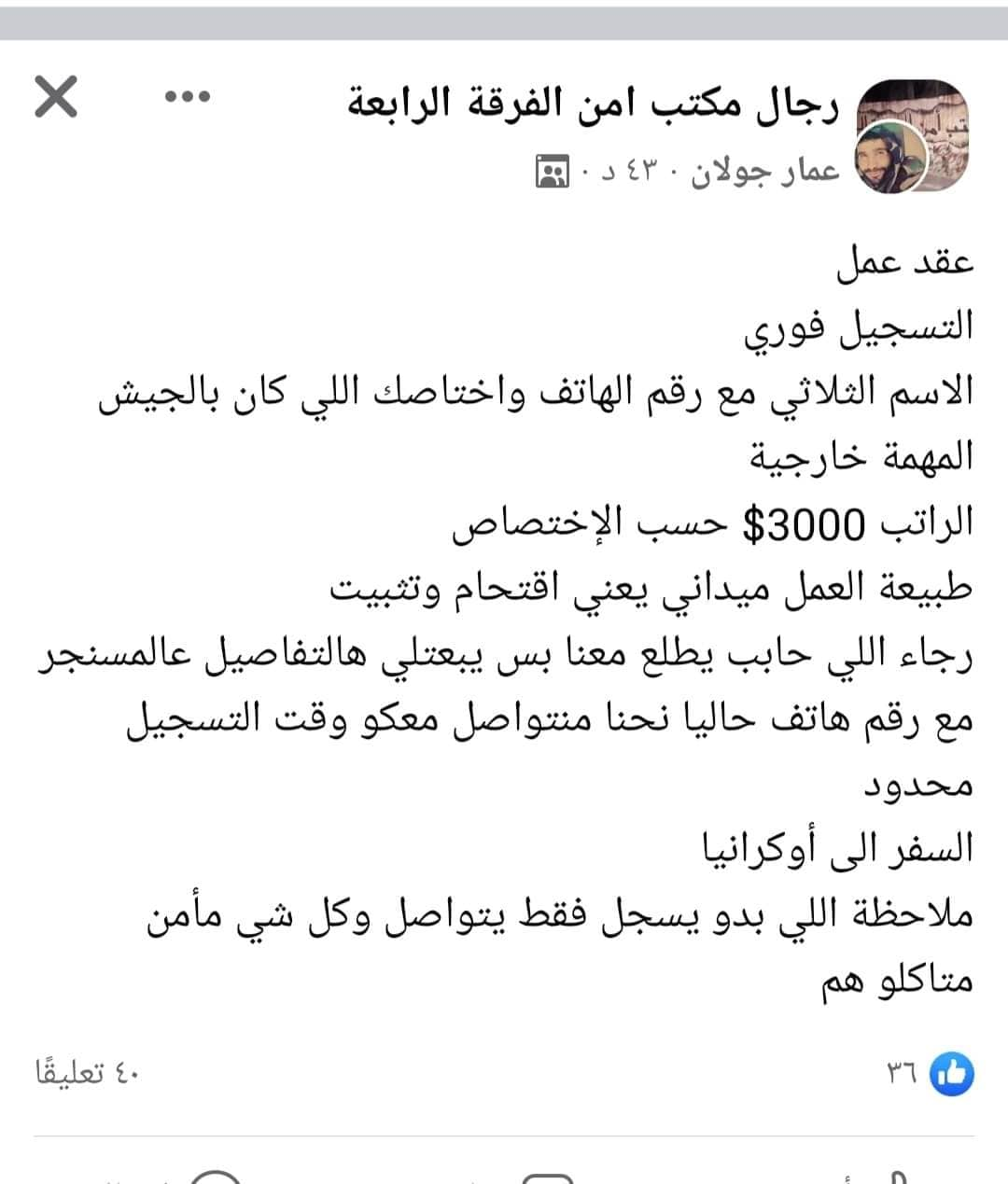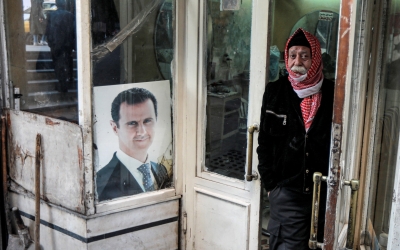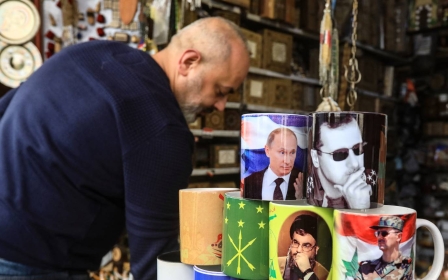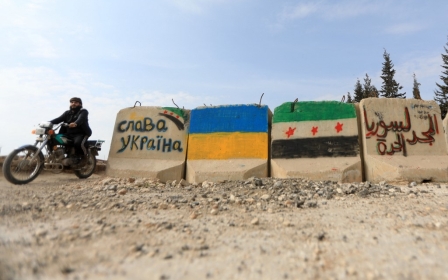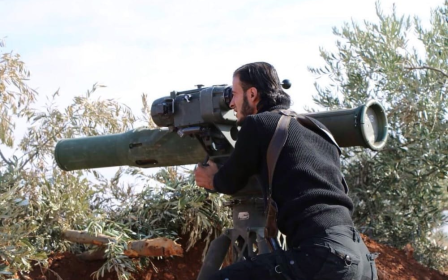Russia-Ukraine war: Moscow recruiting Syrians for invasion
As the Russian invasion of Ukraine grows more violent, the Kremlin's call for volunteers to fight alongside Russia's army has triggered a recruitment rush in Syria.
Though rumours that Syrians were being recruited have circulated for weeks, credible evidence has been scarce. However, a new advert has publicised "combat roles existing for Syrian fighters with experience" in a "foreign mission".
Potential fighters were offered a substantial salary of around "$3,000, depending on the specific skills and expertise each person has". It was not made clear whether that would be a lump sum or a monthly payment.
"Deployment for Ukraine," said the advert, which was shared on Facebook.
New MEE newsletter: Jerusalem Dispatch
Sign up to get the latest insights and analysis on Israel-Palestine, alongside Turkey Unpacked and other MEE newsletters
It was posted onto a private group for soldiers of the Fourth Armoured Division, one of the most significant and largest in the Syrian army, and signals the first genuine foreign recruitment attempt. Eager soldiers commented on the post, asking for a number to contact.
The $3,000 equates to around 7.5 million Syrian pounds, a hefty amount in a country where economic devastation has been rife through a nightmare winter of economic cuts.
Those eager to join up were required "to provide their full names, telephone numbers, and their specialities when they fought with the army... The type of fighting is attack and consolidation," said the ad.
However, the post stressed that registration is limited, perhaps a sign that the Russians are looking initially to trial using Syrian fighters rather than open the floodgates immediately.
Putin’s call to war
Recruitment centres are now likely to spring up around Syria, as a call to arms was issued by Russian President Vladimir Putin on Friday.
Speaking from the Kremlin, Putin told his defence minister on television: "If you see that there are these people who want of their own accord, not for money, to come to help the people living in Donbass, then we need to give them what they want and help them get to the conflict zone."
Sergei Shoigu, the defence minister, said an estimated 16,000 volunteers from the Middle East were ready to be deployed.
Both the Pentagon and US officials speaking to the Wall Street Journal have said that Syrians were being recruited by Russia to fight in Ukraine.
The Wagner Group, a Kremlin-linked private military contractor, previously recruited hundreds of pro-Assad militiamen and ex-rebels to fight in the 2019-2020 Libyan conflict.
Notably, the Russian defence ministry on Friday published a video that appeared to show Syrian army forces ready to head to Ukraine.
Assad left exposed?
While allowing Syrian mercenaries to join the fighting would reduce the risk of adding more Russian soldiers to the fray, it is fraught with problems.
Kyle Glen, co-founder of Conflict News, said it could give Syrian rebel groups more impetus and leave President Bashar al-Assad's government exposed.
'If thousands of Syrians start joining the war in Ukraine, it will weaken the army in Syria'
– Kyle Glen, Conflict News
"If thousands of Syrians start joining the war in Ukraine, it will weaken the army in Syria. HTS [Hay'at Tahrir al-Sham] and others could take this as an opportunity to launch an offensive and gain more territory for themselves," he told Middle East Eye.
"When one side steps up their use of mercenaries, then the other side will as well; it could motivate Syrian opposition fighters to try to travel to Ukraine. We saw Syrian rebel fighter Suheil Hammoud, otherwise known as Abu TOW, posting that he wanted to fight there."
According to Glen, the recruitment shows that the invasion is not going to plan for Moscow.
"I think it's a sign of desperation from Russia if they do bring SAA [Syrian Arab Army] troops in. I believe Russia is getting worried that more Russian soldiers returning in coffins will lead to a decreased support for the war."
Trouble ahead
Russia is the Syrian government's strongest backer, intervening decisively in Syria's civil war in 2015 to keep Assad in power. The Russian invasion of Ukraine, in turn, has been supported by Syrian authorities. Assad described the invasion as "restoring global balance" and a "correction of history".
Several pro-Russian rallies and gatherings have recently been held to support the invasion.
Most Russian military vehicles participating in the Ukraine conflict have the letter "Z" scrawled down their sides, a symbol now known as "za pobedu," meaning "for victory," which has become a rallying cry for supporters of the invasion.
University students in Homs made human Z-shapes and painted the letter on cars as statements of support.
Yet the crisis in Ukraine, especially the fear of global wheat shortages and prices at a 14-year high, will hit Syria hard. Notwithstanding the current economic climate in the country, wheat production declined by over 60 percent in 2021 alone, making starvation a real risk.
With over 12.4 million people currently "food insecure" and estimates indicating that 60 percent of the population is at risk of going hungry, this will create more economic desperation.
This will undoubtedly create a bigger, more desperate pool of combat-hardened and ready men willing to risk their lives for a critical pay cheque at a time where money is scarce and work is limited. Working as a mercenary in a foreign war may be the best financial option for some Syrians in the current climate.
Middle East Eye delivers independent and unrivalled coverage and analysis of the Middle East, North Africa and beyond. To learn more about republishing this content and the associated fees, please fill out this form. More about MEE can be found here.


